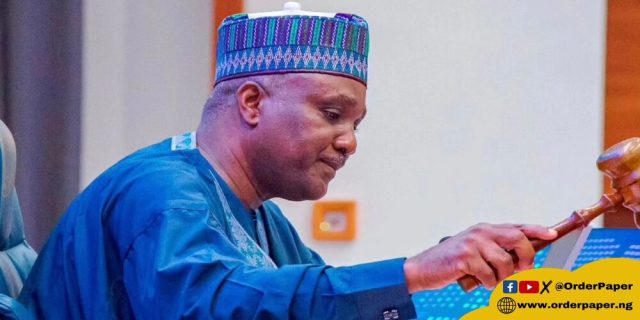Speaker Abbas to sponsor bill for compulsory NASS consultations on electricity as critical problems in sector must be addressed.

The Speaker of the House of Representatives, Rt. Hon. Abbas Tajudeen, Ph.D, has announced plans by him to propose a law that would make it mandatory for the relevant Federal Government bodies to consult the National Assembly and other stakeholders before fixing Electricity tariff.
“Accordingly, I will sponsor a bill to provide administrative procedures that entrench proper consultation and legislative review of process for tariff setting in Nigeria’s electricity and other public services,” he said while declaring open a power sector stakeholders interactive dialogue/workshop organised by the House Committee on Power.
The event was themed: ‘Confronting Nigeria’s Power Challenge as the Nation Migrates to a Multi-Tier Electricity Market: A Legislative Intervention.’
The intervention by the Speaker is coming at a time when Nigerians are criticising the recent electricity tariff increment.
OrderPaper recalls that the Nigerian Electricity Regulatory Commission (NERC) had earlier in April approved an increase in electricity tariff for customers under the Band A classification, with the customers paying N225 kilowatt per hour, up from N66.
Band A customers are those who enjoy not less than 20 hours of electricity supply daily. They represent 15 per cent of the 12 million electricity customers in the country.
The Speaker said he would have expected that the forum and extensive consultations would have preceded the implementation of the new multi-tier electricity system.
“Having this consultation now appears to be an afterthought and goes contrary to the Electricity Act, 2024, which mandates consultation with all relevant stakeholders in determining just and fair tariffs,” he stated.
Speaker Abbas cited Section 33 of the Electricity Act 2024 as establishing the National Electricity Regulatory Commission (NERC) as a public agency subject to the oversight responsibility of the National Assembly under Sections 80-88 of the Constitution.
He stated that Section 34 of the Act specifically empowers the NERC ‘to ensure that the prices charged by the licensee are fair to consumers and are sufficient to allow licensees to finance their activities and to allow for reasonable profit for efficient operation’ and to ‘ensure that regulation is fair and balanced for customers, licensee, investors and other stakeholders.’
Speaker Abbas said: “I hope this forum allows all stakeholders to interrogate whether the new system meets the criteria outlined in the Act.
“The fundamental principles of just and fair pricing of electricity as laid out by a leading authority in this field are (1) simplicity, (2) understandability, (3) acceptability, (4) non-controversial, (5) stability, and (6) non-discriminatory. The question before you today is whether the new tariff model meets these principles.
“In framing the way forward, we can look towards best practices and successful models from other countries that have implemented similar market structures. Notable strategies include strong regulatory oversight to ensure fairness and transparency across all tiers.”
The Speaker stressed the need to address the problems bedevilling the power sector and electricity value chain in Nigeria and also stated that the House’s commitment to “transforming the power sector into a model of efficiency and sustainability is unwavering.”
